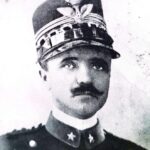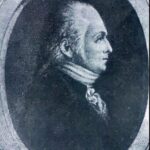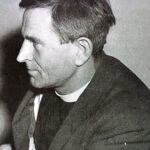QUARTEY-PAPAFIO, BENJAMIN WILLIAM QUARTEQUAYE
- 5 Min Read
Benjamin William Quartequaye Quartey-Papafio (June 25, 1859-September 14, 1924) served the Gold Coast administration as a medical officer from 1888-1905. Barred from promotion on racial grounds, he became prominent in nationalistic politics in the earlier years of the 20th century.

PHOTO CAPTION: Dr. Benjamin William Quartey-Papafio SOURCE: qpmf
He was born in Accra in 1859. His father was Nee Kwatei-kojo Kpakpafio of the Asere district of Accra, and his mother was Momo Amedru. He was educated at the Church Mission Society (C.M.S.) Grammar School in Freetown, Sierra Leone, and at the universities of Durham, London, and Edinburgh in the United Kingdom. He qualified as a medical doctor in 1886.
On his return to the Gold Coast in 1888, he entered the Colonial Medical Service, the first African from the Gold Coast to do so. This was the period when Africans could rise to become chief medical officers. When, in 1894, Dr. J. F. Easmon, a Sierra Leonean, was about to be promoted chief medical officer of the Gold Coast, Dr. Quartey-Papafio petitioned the British Secretary of State for the Colonies against the appointment, on grounds that Easmon was not a Gold Coaster, and that he, Dr. Quartey-Papafio, deserved the post. At the same time, on June 23, 1894, an article attacking Easmon appeared in the Gold Coast Chronicle, which was partly owned by the Papafio family.
Dr. Easmon’s appointment was nevertheless upheld, although he was later suspended in 1897. After Easmon’s suspension, Dr. Quartey-Papafio had expected to be appointed in his place, but the post went to an European. (Dr. Quartey-Papafio meanwhile acted as Chief Medical Officer on a number of occasions). When Dr. Quartey-Papafio petitioned the Governor about this, he was told that the government did not wish to appoint natives to supervise Europeans. After this, the Secretary of State for the Colonies issued rules excluding Africans from certain higher posts in the civil service. Dr. Quartey-Papafio therefore retired from the Medical Department in 1905, and turned to politics.
He was appointed a municipal member of the Accra Municipal Council from 1909-1912. Though there was no branch of the Aborigines’ Rights Protection Society (A.R.P.S.), the influential organisation of educated Africans which defended African interests, in Accra, certain individuals in Accra nevertheless belonged to it. Dr. Quartey-Papafio thus took an active part in the work of the A.R.P.S. through his association with its members who also belonged to the Gold Coast Native Institutions Conservation Society, to which he himself belonged, and which had been formed in Accra in 1911. (This latter society had been formed partly because the educated elite in Accra were jealous of the domination of the A.R.P.S. by the Cape Coast elite.). When the A.R.P.S sent a delegation to the Colonial Office in London to lobby against the Forest Lands Bill of 1911, Dr. Quartey-Papafio was a member of it. The delegation received an audience with the Secretary of State for the Colonies on June 28, 1912, and later appeared before a West African Lands Committee. Though the delegation appeared at first to have achieved nothing in Britain, when the Committee’s draft report was later presented to Governor Sir Hugh Clifford (term of office 1912-1919) in Accra, he rejected it. The A.R.P.S. had won the battle against the bill.
Dr. Quartey-Papafio was interested in enlightening the public about national affairs, and in 1895 had founded a Social Union in Accra. Like most of the literary Societies of the time, it did not, however, survive its founder. He was also interested in education, and was one of the founders of the Accra Grammar School.
In 1919 he was appointed as an unofficial member of the Legislative Council, and took an active part in its proceedings, speaking frequently on education and health matters. He took part in the opposition to the government’s Native Jurisdiction Bill of 1919, as well as the revised version of the bill that was presented in 1922, attacking the government for encroaching on native institutions. He moved the rejection of the bill on the grounds that it weakened ‘’the inherent rights and powers of the Chiefs,’’ and because it sought to create ‘’ new native authorities not racy of the soil.’’ The bill was ultimately withdrawn by Governor Sir Gordon Guggisberg, largely because the paramount chiefs opposed it.
When the formation of the National Congress of British West Africa was debated in the Council, Dr. Quartey-Papafio opposed it– firstly because he felt that Congress members had acted unconstitutionally by not first seeking the mandate of the chiefs, and secondly because he felt that British West Africa was not a united entity. He supported Nana Ofori Atta I against the leaders of the Congress, J. E. Casely Hayford and T. Hutton Mills. In the event, the Congress did not obtain recognition because of the opposition of Governor Guggisberg.
He pressed for narrowing the gulf between the salaries of expatriates (Europeans) and those of Africans, advocated salary increases for competent Africans in public service in general. He urged the use of competent Africans as vaccination officers to check smallpox epidemics. He also recommended that a bureau be established in the Department of Agriculture to work in cooperation with the personnel of Kew Gardens, the botanical centre in London.
Together with other prominent Africans of his time, he petitioned the Secretary of State for the Colonies, through Governor Guggisberg, to allow Nana Prempeh I of Asante to return home from exile. It is said that, among other factors, Guggisberg was impressed that Dr. Quartey-Papafio, a Ga and not an Asante, should have championed the cause of the exiled Asantehene, and therefore decided to recommend his repatriation.
He was awarded the Order of the British Empire (O.B.E.) in June 1923. He died in 1924.
L. H. OFOSU-APPIAH





